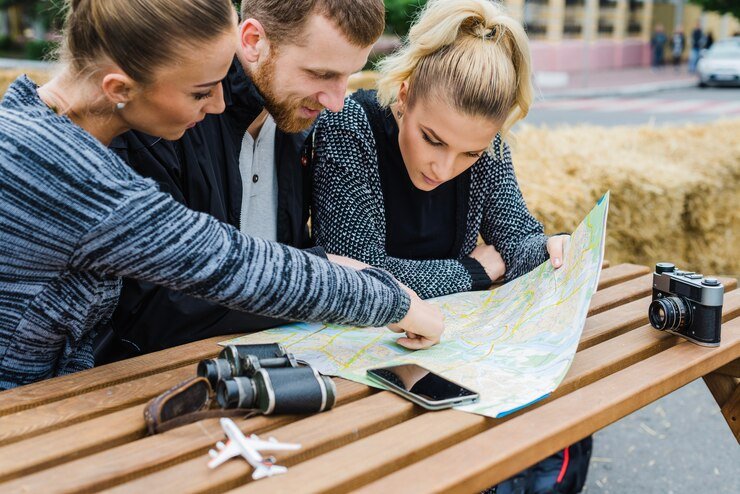Table of Contents
ToggleTravel Guide is an adventure that opens doors to new experiences, cultures, and memories. Whether you’re embarking on a solo journey, planning a family vacation, or exploring with friends, mastering the art of travel can significantly enhance your trip. This comprehensive guide offers essential tips and tricks to ensure your travels are smooth, enjoyable, and unforgettable.
1. Planning Your Trip: Travel Guide

Effective trip planning is the foundation of a successful journey. Begin by setting a budget that includes accommodations, transportation, meals, activities, and unexpected expenses. Determine your destination based on your interests—whether it’s a bustling city, a serene beach, or a historical landmark. Research the best time to visit, considering weather conditions, peak tourist seasons, and local events that may influence your experience.
Utilize reputable travel websites and apps to compare flight options, hotel rates, and rental car services. Booking early often yields better deals. Consider travel insurance to protect against unforeseen circumstances like trip cancellations, medical emergencies, or lost luggage.
2. Packing Tips
Packing efficiently can make your journey more comfortable and stress-free. Create a packing list tailored to your destination and activities. Start with essentials such as clothing suitable for the climate and activities planned, toiletries, medications, and any necessary travel documents (passport, visas, identification). Pack versatile items that can be mixed and matched to create different outfits.
Invest in lightweight and durable luggage with secure locks. Consider packing a small first-aid kit, travel-size toiletries, a portable charger, and a travel adapter if visiting countries with different electrical outlets.
Also Read : 10 Proven Strategies For Acing Defence Exams!
3. Safety and Security
Prioritize safety by researching your destination’s safety guidelines and potential risks before departure. Register with your country’s embassy or consulate when traveling to high-risk areas. Keep copies of important documents such as your passport, visa, travel insurance policy, and emergency contacts in a secure location separate from the originals.
Use caution when sharing personal information and avoid displaying valuables in public. Secure your belongings with a reliable travel lock or anti-theft bag. Stay aware of your surroundings, especially in crowded or unfamiliar areas, and trust your instincts if a situation feels unsafe.
Also Read : Unlock Opportunities With PSU Exams Jobs
4. Money Matters

Managing finances wisely can prevent unnecessary stress during your trip. Notify your bank or credit card company of your travel plans to avoid unexpected card blocks due to suspicious transactions. Carry a mix of payment options such as local currency, credit/debit cards with no foreign transaction fees, and traveler’s checks as backups.
Use ATMs located in secure areas, such as banks or hotels, and be cautious of ATM skimming scams. Consider using a travel money belt or hidden wallet to carry cash and important documents discreetly. Keep track of your spending and save receipts for budget management and potential reimbursement.
Also Read : Top Civil Engineering Colleges In The USA 2024
5. Cultural Etiquette
Respecting local customs enhances your travel experience and fosters positive interactions with locals. Research cultural norms, traditions, and taboos specific to your destination. Learn a few basic phrases in the local language, such as greetings and polite expressions, to show respect and facilitate communication.
Observe dress codes, particularly when visiting religious sites or attending formal events. Be mindful of local behaviors, gestures, and social norms to avoid unintentionally offending others. Embrace cultural differences with an open mind and a willingness to learn, and remember that a sincere effort to understand and respect local customs is often appreciated.
Also Read : CTET Conqueror’s Handbook: Your Key To Educational Success!
6. Health and Wellness

Maintaining good health is essential for enjoying your trip to the fullest. Stay hydrated by drinking plenty of water, especially in hot climates or during physical activities. Pack necessary medications, including prescriptions and over-the-counter remedies for common travel ailments such as motion sickness or allergies.
Eat balanced meals that include local specialties while practicing food safety precautions. Wash hands frequently with soap and water or use hand sanitizer, especially before eating or after using public facilities. Protect yourself from sun exposure with sunscreen, sunglasses, and a wide-brimmed hat, and apply insect repellent when visiting areas prone to mosquitoes or other pests.
Also Read : Land Your Dream Role With IIFT Exam Jobs
7. Making the Most of Your Trip
Making your travel experience memorable involves embracing new adventures and immersing yourself in local culture. Engage with locals by participating in cultural activities, attending festivals, or exploring off-the-beaten-path attractions. Keep a travel journal or blog to document your experiences and reflect on your journey.
Capture moments with photographs or videos to share with friends and family back home. Try local cuisine at traditional restaurants or street markets, and sample regional specialties for a taste of authentic flavors. Stay flexible and open to spontaneous opportunities that may lead to unexpected discoveries and lasting memories.
Also Read : What Are The Top Road Trips Destinations In USA?
Conclusion
Traveling is an enriching experience that broadens perspectives and creates lasting memories. By incorporating these essential tips and tricks into your travel planning and experience, you can navigate challenges with confidence and maximize enjoyment. Whether you’re exploring iconic landmarks, relaxing on a tropical beach, or immersing yourself in local culture, preparation and mindfulness will ensure that every journey is a rewarding adventure.
Remember, the key to a successful trip lies in thorough planning, cultural sensitivity, and a willingness to embrace new experiences. With these tools at your disposal, you can embark on your next travel adventure with enthusiasm and excitement, knowing that you are well-prepared to make the most of every moment.
FAQs
Q: Should I exchange currency before I travel? A: It’s advisable to exchange a small amount of currency before your trip to cover immediate expenses upon arrival. However, for the best exchange rates, consider withdrawing local currency from ATMs at your destination or using credit/debit cards with no foreign transaction fees.
Q: How far in advance should I book my accommodations? A: Booking accommodations several months in advance is recommended, especially during peak travel seasons or for popular destinations. This ensures availability and often allows you to secure better rates.
Q: Is travel insurance necessary for every trip? A: While travel insurance is not mandatory, it provides valuable coverage for unexpected events such as trip cancellations, medical emergencies, or lost luggage. Evaluate your travel plans and consider purchasing insurance that suits your needs.
Q: What should I do if I lose my passport or travel documents abroad? A: Contact the nearest embassy or consulate of your home country immediately for assistance. They can provide guidance on obtaining a replacement passport and navigating any legal requirements for re-entering your country.
Q: How can I stay connected with loved ones while traveling internationally? A: Stay connected by purchasing a local SIM card for your phone upon arrival, using Wi-Fi at accommodations and public places, or downloading communication apps that allow free messaging and calling over Wi-Fi.
Q: What should I do if I encounter a language barrier during my travels? A: Overcome language barriers by learning basic phrases in the local language, using translation apps, carrying a phrasebook, and relying on non-verbal communication such as gestures and pointing to convey your needs.
Q: How can I find authentic local experiences and avoid tourist traps? A: Seek recommendations from locals, explore neighborhoods away from tourist hotspots, participate in guided tours led by knowledgeable guides, and research online forums and travel blogs for insider tips on hidden gems.
Q: What are some sustainable travel practices I can adopt during my trip? A: Practice sustainable travel by minimizing plastic waste, conserving water and energy, supporting local businesses and artisans, respecting wildlife and natural habitats, and following designated trails and guidelines for outdoor activities.
Q: What should I do if I experience travel-related anxiety or stress? A: Manage travel-related anxiety by practicing relaxation techniques, maintaining a flexible itinerary, staying organized with travel plans, seeking support from travel companions or local resources, and focusing on positive experiences and personal growth during your journey.
Q: How can I maximize my travel budget and save money on expenses? A: Maximize your travel budget by researching affordable accommodations, dining options, and activities, taking advantage of discounts and travel rewards programs, opting for public transportation or walking instead of taxis, and avoiding unnecessary purchases or impulse spending.





